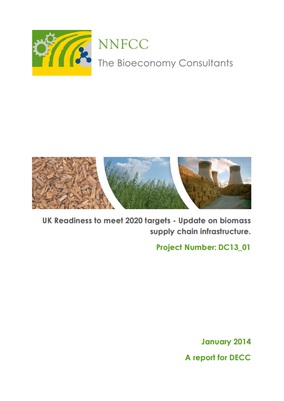Highlights
- UK biomass demand for the power sector up to 2020
- Major transport routes mapped for biopower supply chains
- Port handling capacities, road and rail biomass distribution capacities across the UK
- Infrastructure constraints, and investment required to overcome these
Reasons
to buy
- Understand the strengths and weaknesses in the UK infrastructure to transport biomass
- To inform investment decisions in biomass
- To plan best location for biomass developments
- To inform policy decisions and investment in infrastructure
Number
of pages:15 page summary
The full report (80 pages) underpins this one summary, but contains confidential information from individual developers so we
are unable to share the full report. However, if readers would like further
information they should contact NNFCC to discuss their needs and whether we can
provide the necessary info.
Summary
The Renewables Roadmap, published in 2011, stated
the government‘s plan to triple the current UK biomass electricity capacity.
NNFCC conducted analyses of the capacity and constraints of the infrastructure and supply
chain, and the associated risks in meeting the UK 2020 renewable energy targets, in
2012 and an update report in 2014.
The aim of this project was to define the baseline of existing biomass
supply infrastructure in the UK and understand the temporal and geographical
dynamics of expected supply chains as a means to establish whether UK
infrastructure will be sufficient to meet the demand of the UK biomass market
leading up to 2020.
To provide an accurate estimation of the biomass feedstock volumes that
will be required by the UK power sector, NNFCC engaged with major industry
developers to establish their intentions for development of biomass power
facilities. This data was then used to develop biomass demand projections
leading to 2020. Alongside this work, estimates for future port handling
capacity were calculated and an assessment of the potential for biomass to be
distributed on the rail network was undertaken using information gathered
through discussions with port operators, Network Rail and major UK freight
operating companies. The outputs were then used to predict whether infrastructure
constraints may act as a limiting factor to expansion of the UK biomass market.
UK biomass infrastructure capacity, planned expansion
and constraints were analysed for:
- Biomass power facilities
- Large biomass storage
- Feedstock transport routes
- Ports
- Rail network
- Roads
- Freight operators
To read more please become a business subscribers or for individual purchase.
See also
Talk to the experts
For business solutions call NNFCC on +44 (0)1904 435 182 or email
enquiries@nnfcc.co.uk